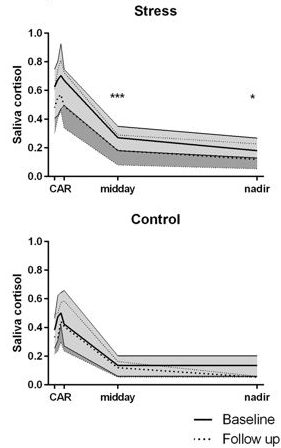Stress and workplace burnout are huge costs for business, and are notoriously hard to detect and measure. But that might be changing – thanks to saliva.
It seems Google’s search algorithm has figured out we’re terrible at knowing when work stress has gotten to us. You can check – type in “burnout” and you’ll find dozens of articles probing whether you have it, or offering a guide to detecting it.
Perhaps it’s not surprising. How do you differentiate work stress from your ordinary stress? Is it your job making you more anxious, or is it something else? This lack of clarity is not just an issue for employers. Evidence suggests burnout is linked with prolonged sick leave, premature retirement, and the development of mental health issues. So a cut-and-dry way to detect burnout would benefit employee and employer alike.
We may have an answer. And it’s lurking in our saliva.
Spit take
Specifically, new research published in Scientific Reports has found that higher cortisol levels in your saliva around midday and night are a strong indicator that you’re suffering from burnout.
As described in the study, psychological stress is believed to result in the release of cortisol into our blood circulation. However, we also release cortisol as part of waking up, about 77 per cent of healthy people experience a big increase of cortisol levels within the first hour of their day. This is followed by a tailing off (see the control image below).
What the new study shows is that high levels of stress, depression and anxiety are reflected by higher concentrations of cortisol in your saliva from around midday onwards.
Source: Nature.com
Privacy concerns
Of course, there is a privacy issue surrounding saliva tests, much as there are in drug testing programs. If you were of the mind, the best bet for compulsory tests would be to connect it with workplace health and safety.
Michael Byrnes touched on this in a previous article for HRM about whether employers could compel staff to be microchipped: “If microchipping employees can be shown to have substantial safety benefits, and the process of implanting can be done in a safe, quick, painless and unobtrusive way – with proper measures to protect privacy – then the legal path might just be cleared.”
At least one study backs up the claim that stress and burnout increase accidents. But more interestingly, burnout itself could be considered a type of workplace injury. It has been linked with depression and anxiety disorders, so there’s potential for an organisation to frame their saliva program as a benefit for them. Especially if they tied a positive result with stress leave or some other program for helping the employee.
The obvious hiccup for any organisation would be in the introducing of the slobber-related policy. As far as company announcements go, this is pretty awkward: “Twice every Monday you will either give us a mouth swab, or spit into a cup. It’s for your own good.”
The future of wellbeing
It might seem far fetched that any organisation would actually implement a saliva test to check for burnout among employees but think about it. Not only are overstressed employees more likely to take prolonged sick leave, develop mental health issues, and leave your organisation – there is a legal risk component.
Employers are facing increasing mental health claims and there are thorny IR questions as to what extent organisations owe their staff resilience wellbeing, and resilience training. A test which promises clarity around this issue, and allows employers to more effectively help and manage their workforce, could be a boon.


